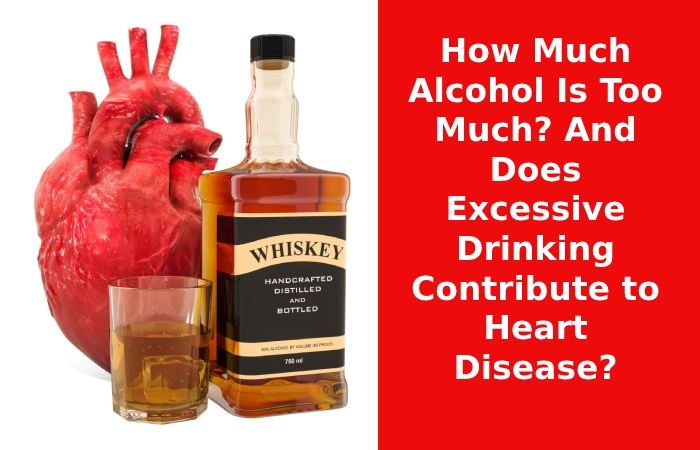As per the new study, no alcohol consumption is good for heart health. Several studies have shown that heavier drinkers are at increased risk for heart failure, high blood pressure, heart attack, arrhythmias, stroke, and death. Light alcohol consumption, on the other hand, has been linked to a lower risk of heart disease. But a large study has challenged this theory.
This new study supports the WHO’s stance on alcohol consumption, stating that moderate alcohol intake does not offer cardiovascular benefits. In the past, some studies had suggested that average alcohol consumption, particularly red wine, can associated with a reduced risk of heart disease. However, more recent and extensive research has challenged this nation, highlighting the potential dangers of alcohol consumption on overall health.
A World View On Alcohol Consumption By World Heart Federation

The World Health Federation is a Geneva-based health advocacy association representing many heart associations worldwide. It was unconfined the new policy brief, “The Impact of Alcohol Consumption on Cardiovascular Health: Myths and Measures,” . To secure reports that some alcohol is OK or good for heart health.
Drinking alcohol builds the risk of many cardiovascular problems, including coronary disease, heart failure, high blood pressure, stroke, and aortic aneurysm, as per the report. Any amount of alcohol, not just heavy drinking, can lead to the loss of a healthy life. “Over the recent decades, the prevalence of cardiovascular disease has almost multiplied, and alcohol has played a major role in the frequency of a lot of it,” the report says.
Thus, Cardiovascular disease is a leading basis of death worldwide, affecting individuals of low socioeconomic status. In 2019, nearly 2.4 million deaths – not only heart-connected – could be attributed to alcohol, the report said. Alcohol negatively affects mental health, as well.
The World Health Organization has required a 10% relative decrease in the per capita use of alcohol between 2013 and 2030. Still, the report said a lack of investment in proven alcohol reduction strategies and misinformation from the industry has delayed progress toward that goal.
Twisted Misunderstandings and Implementing Strategies Of Alcohol Consumption and Heart Health:

The effect of alcohol consumption on cardiovascular health has been a topic of debate for many years. There have been various myths and misconceptions surrounding the issue, with some studies suggesting potential benefits. While others highlight the harmful effects of alcohol on heart health. Keep reading about the correlation between alcohol and heart disease. Let’s explore the myths and the measures that cause this issue:
1. Myth: Moderate alcohol consumption is good for heart health.
Truth: Previous studies suggested that moderate alcohol consumption, particularly red wine, might be associated with a reduced risk of heart disease. However, more recent and extensive research has shown that even moderate alcohol intake does not offer cardiovascular benefits and may even be harmful.
2. Myth: Drinking alcohol raises “good” cholesterol levels.
Truth: While some studies have indicated that moderate alcohol consumption might raise high-density lipoprotein (HDL) cholesterol levels, also known as “good” cholesterol. The overall impact of alcohol on heart health remains negative. The potential increase in HDL cholesterol does not outweigh the risks associated with alcohol consumption.
Does Alcohol Protect Against Heart Problems?

Thus, people who sip red wine have higher incomes. Which tend to be associated with more education and greater access to healthier foods. Similarly, red wine drinkers might be likelier to eat a heart-healthy diet. But no as per new study consumption of alcohol is not good for heart health.
There is some evidence that modest amounts of alcohol might help slightly raise “good” HDL cholesterol levels. Researchers have also recommended that, in a specific way, red wine may protect the heart thanks to its antioxidants.
But we don’t have to pop a cork to gain those benefits. Exercise can also boost HDL cholesterol levels; antioxidants are also in other foods, such as fruits, vegetables, and grape juice.
Measures to Address the Impact of Alcohol Consumption on Cardiac Health
Control alcohol intake or avoid it altogether: The World Health Organization (WHO) encourages people to avoid alcohol altogether or consume it in moderation. Thus, to reduce the risk of adverse health effects.
Prioritize a heart-healthy lifestyle: To encourage heart health, focus on a balanced diet rich in vegetables, whole grains, fruits, lean proteins, and healthy fats. In addition, engage in regular physical activity and maintain a healthy weight.
Avoid binge drinking: An growth in the risk of heart attack, stroke, and other heart-related issues can result from binge drinking. Which is apparent as consuming a high amount of alcohol quickly.
Seek medical advice: If you are worried about how much alcohol you consume and how it may affect your heart health? Speak with a healthcare provider for personalized advice and suggestions.
Public awareness campaigns: To promote appropriate drinking practices, governments, and health organizations should keep raising awareness of the detrimental effects that alcohol intake has on the heart and general well-being.
How Much Alcohol Is Too Much? And Does Excessive Drinking Contribute to Heart Disease?

Whether or not rational drinking is good for your heart is open to debate. However, for most people, it doesn’t appear harmful to the heart — but the key word is “moderate.” Moderate drinking is an average of one drink per day for women and one or two for men.
A drink may be less than you think: 12 ounces of beer, 4 ounces of wine, or 1.5 ounces of 80-proof spirits. People should also avoid even that much and not drink if they have specific heart rhythm abnormalities or heart failure.
Excessive Drinking Contribute to Heart Disease
On the other hand, heavy drinking can cause several poor health outcomes, including heart conditions. Excessive alcohol intake can cause high blood pressure, heart failure, or stroke. And excessive drinking can also subsidize cardiomyopathy, a disorder affecting the heart muscle.
Moreover, alcohol can add to obesity and the long list of health issues accompanying it. Alcohol is a source of extra calories and a cause of weight gain that can be harmful in the long term.
Conclusion
Hence, according to new study alcohol consumption not good for heart health. Alcohol increases the risk of hypertensive heart disease, cardiomyopathy, atrial fibrillation, flutter, and strokes. Alcohol consumption (100gm/week) is linearly associated with a higher risk of stroke, heart failure, fatal hypertensive disease, and fatal aortic aneurysms. It has a borderline elevation in the risk of coronary heart disease compared to those consuming 0-25g/ week.
Thus, they debate that people with moderate consumption and no binge episodes may have a slightly lower risk of ischaemic heart disease (IHD). Still, the protective effect of average alcohol consumption for CVD has been challenging. Contrary to popular opinion, alcohol is not suitable for the heart. It directly contradicts the common and popular message that alcohol prolongs life, chiefly by reducing the risk of CVD.
Related posts
Featured Posts
What Is A Web Project? – Phases For Planning, and More
Introduction Web Project The term ” web project ” can designate different development types, including technical creation, content management, data,…
10 Benefits of Eating Roasted Gram
In this article, we will talk about the 10 benefits of eating roasted gram. The roasted gram is also known…


